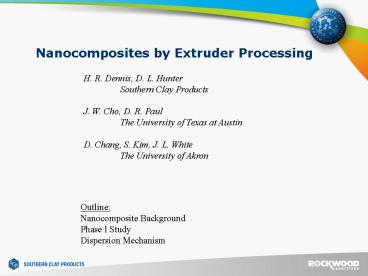Nanocomposites by Extruder Processing - PowerPoint PPT Presentation
1 / 22
Title:
Nanocomposites by Extruder Processing
Description:
US 5,747,560 1998 AlliedSignal Melt Blend Process for Nanocomposites ... Melt Blending Literature. US 3,084,117 1963 Union Oil Company. Chem. Mater. ... – PowerPoint PPT presentation
Number of Views:487
Avg rating:3.0/5.0
Title: Nanocomposites by Extruder Processing
1
Nanocomposites by Extruder Processing
H. R. Dennis, D. L. Hunter Southern Clay
Products J. W. Cho, D. R. Paul The University
of Texas at Austin D. Chang, S. Kim, J. L.
White The University of Akron
Outline Nanocomposite Background Phase I
Study Dispersion Mechanism
2
Historical Nanocomposite Literature
US 2,531,396 1950 National Lead
Onium Ion Treated Clay to Reinforce
Elastomers US 3,084,117 1963 Union Oil Company
Organoclay-Polyolefin Composition
Masterbatch, Melt Blend, Solvent,
Protonated Amine JP 10,998 1976 Unitika
In Situ Process Layered
silicate Polyamide US 4,739,007
1988 Toyota Composition Layer Silicate
Polyamide US 5,747,560 1998 AlliedSignal
Melt Blend Process for
Nanocomposites Clay Treated with
Protonated Primary and Secondary Amine
3
Melt Blending Literature
US 3,084,117 1963 Union Oil
Company Chem. Mater. 1995
Vaia, Giannelis, et al Macromolecules US
5,747,560 1998
AlliedSignal J. Appl. Polym. Sci. 1999
Liu, et al
4
Smectites
SEM Bentonite Rock TEM
Montmorillonite
1 micron
5
Smectite Clay Chemistry
6
Nanocomposite Language
7
The Processing Challenge
8µm Particle gt 1MM
Platelets
8
Dispersion Study Design
- Nylon 6, Capron B135WP
- Two Organoclays
- Cloisite 30B -- Exfoliates
- Cloisite 15A -- Intercalates
- Vary Extruders and Configurations
- Killion Single Screw
- Japan Steel Works Co-Rotating, 2 Screws
- Leistritz Counter Rotating Intermeshing, 3 Screws
- Leistritz Counter Rotating Tangential, 3 Screws
- Twin Screw Conditions
- Feed Rate 5kg/hr
- Screw Speed 200rpm
- Temperature Profile 240ºC
- Goal Delamination or Exfoliation and
Dispersion
9
Single and Co Rotating Screws
Killion Single Screw Japan Steel Works Co
Rotating Twin Screw
Low Shear
Medium Shear
10
Leistritz Counter Rotating Intermeshing
Low Shear
Medium Shear
High Shear
11
Leistritz Counter Rotating Non-Intermeshing
Low Shear
Medium Shear
High Shear
12
XRD Examples 15A/PA6
13
TEM Examples 15A/PA6
Single Screw
Co Rotating, Low Shear
Co Rotating, Medium Shear Tangential,
Medium Shear
14
TEM Dispersion
15
(No Transcript)
16
(No Transcript)
17
MS
Slide 20
HS
MS
MS
LS
LS
HS
LS
18
Dispersion Mechanism
8 µm Particle gt 3000 Platelets
Chemistry Chemistry/Processing
Processing
Tactoids/ Intercalants
Tactoids/ Intercalants
Tactoids/ Intercalants
Dispersion
Partial Dispersion
Dispersion
Tactoids/ Intercalants
19
Dispersion Mechanism
Particles Shear Apart
Platelets Peel Apart
20
Dispersion Particles Shear Apart Platelets
Peel Apart
Particles Shear Apart
Platelets Peel Apart
21
(No Transcript)
22
Conclusions
- To Optimize Dispersion Clay Treatment
Processing - Longer Residence Time Important, Not only
Variable - Dispersion not Simply a Function of Shear
Intensity - Particles Shear Apart
- Platelets Peel Apart to Disperse































